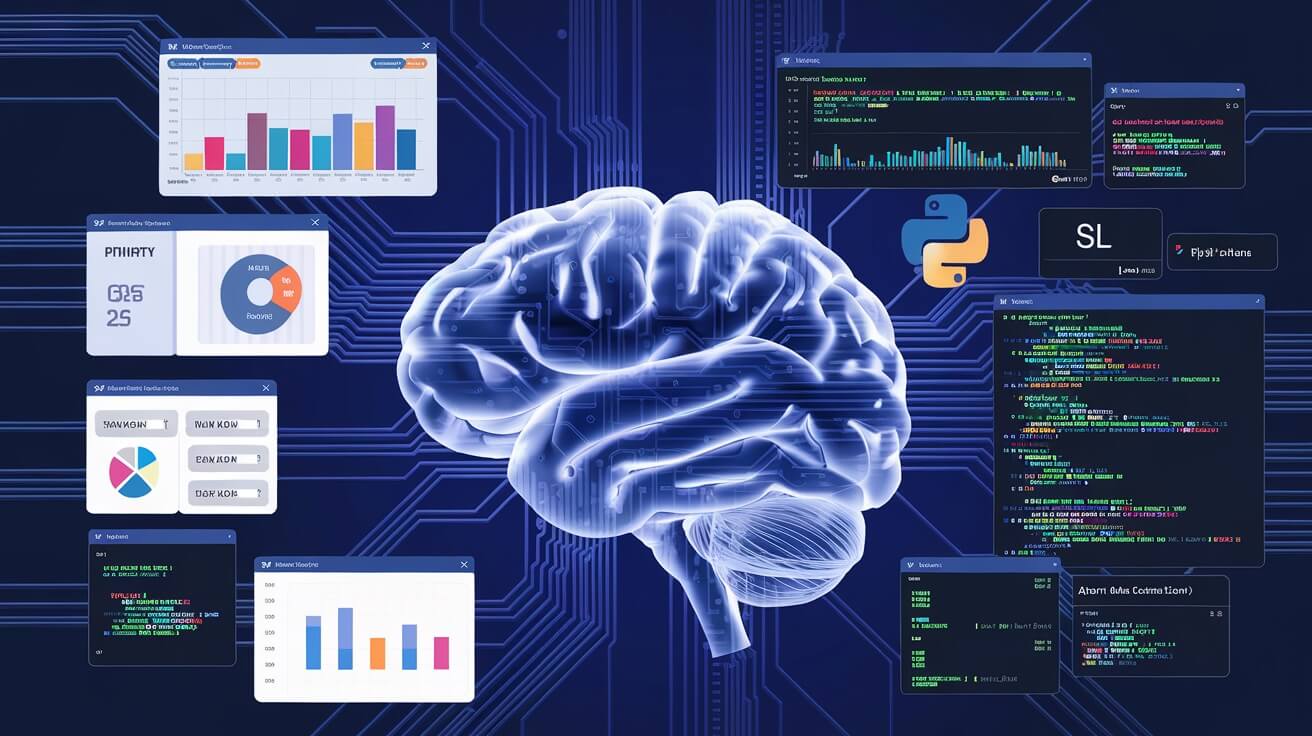
Top Skills Required for Data Scientist: Your Guide to Building a Career in Data Science
Introduction:
In Data Science, skills are everything. The industry is booming, and companies are constantly searching for skilled professionals who can unlock the potential of data. But what exactly do you need to succeed in Data Science? Knowing the specific skills in demand is essential if you’re looking to start or advance your career in this field.
Being a Data Scientist isn’t just about knowing data—it’s about how you work with it. Data Science demands a distinct mix of technical skills, problem-solving abilities, and clear communication of results. From programming to problem-solving, this article will cover each skill you need and provide insights on how to develop them.

Essential Technical Skills for Data Scientists
1. Programming Skills
At the heart of Data Science is programming. Most Data Scientists work with languages like Python, R, and SQL. Python is incredibly flexible, enabling users to handle data manipulation, conduct statistical analysis, and apply machine learning within the same language. R is famous for statistical analysis, while SQL is essential for managing and querying database data.
-
Why It Matters: With strong programming skills, you can automate data processes, conduct analyses, and build models to uncover trends and make predictions.
-
How to Get Started: Begin with Python or R and focus on one language until you’re confident. Sites like Codecademy and Coursera offer beginner courses on data science applications.
2. Data Wrangling and Preparation
Data Wrangling, or preparing raw data for analysis, is essential. Raw data is often messy, full of inconsistencies, or missing values. Cleaning and organizing this data is necessary to ensure accuracy in your analysis. Tools like Pandas in Python make data wrangling efficient.
-
Why It Matters: Properly prepared data provides a reliable foundation for analysis, so your findings are trustworthy and actionable.
-
How to Get Started: Practice with tools like Pandas and SQL using publicly available datasets on platforms like Kaggle. The more you work with data, the more accessible data wrangling will become.
3. Machine Learning and AI Knowledge
Machine learning allows Data Scientists to build models that predict future events or identify patterns in large datasets. From classification and clustering to neural networks, machine learning techniques can uncover insights in ways that traditional analysis cannot. Familiarity with libraries like TensorFlow or scikit-learn in Python can help you get started.
-
Why It Matters: Machine learning models allow businesses to trend and make strategic decisions based on data insights.
-
How to Get Started: Take a foundational machine learning course on platforms like Coursera or Udacity—practice by building simple models using libraries such as scikit-learn and TensorFlow.
Core Analytical and Statistical Skills
1. Statistical Analysis
Statistics form the backbone of Data Science, helping you interpret data and draw meaningful conclusions. Knowledge of probability, regression analysis, and hypothesis testing is essential in understanding and predicting data trends.
-
Why It Matters: A solid grasp of statistics allows you to build reliable models and make informed decisions.
-
How to Get Started: Review basic statistical concepts through resources like Khan Academy and practice with real-world datasets to deepen your understanding.
2. Data Visualization and Communication
Visualization is how Data Scientists translate raw numbers into stories. Using tools like Tableau, Power BI, or Matplotlib in Python, Data Scientists can create visual representations that make complex data more understandable to stakeholders.
-
Why It Matters: Effective visualization allows teams to see insights quickly and makes communicating data-driven decisions easier.
-
How to Get Started: Start with free resources on Tableau Public or practice using Python libraries. Visualizing even small datasets will help you communicate results effectively.
Critical Soft Skills for Data Scientists
1. Problem-Solving
Problem-solving is at the core of Data Science work. Data rarely presents itself in a neat package and often takes creative approaches to extract meaningful insights. From framing the right questions to interpreting findings, problem-solving is a constant requirement.
-
Why It Matters: Data scientists' ability to identify and solve problems quickly makes Them valuable assets in any organization.
-
How to Get Started: Take on projects with unstructured data, as they often present unique challenges that will hone your problem-solving skills.
2. Communication and Collaboration
Data Scientists work with people from various departments, from marketing and finance to product development. Effective communication ensures everyone understands the data insights and can make informed decisions. Collaboration is also key for working on cross-functional projects.
-
Why It Matters: Communicating your findings helps ensure your insights are actionable.
-
How to Get Started: Practice explaining your analyses to a friend or mentor who isn’t a Data Scientist. If they can understand your findings, you’re on the right track.
Specialized Data Science Tools and Technologies
Data Scientists use various tools to make their work more accessible and efficient. Tools like Jupyter Notebooks for code, Hadoop for big data processing, and SQL databases are common in the field.
-
Why It Matters: Using the right tools saves time and makes your work more accurate, allowing you to tackle more extensive and complex datasets.
-
How to Get Started: Explore these tools through free online tutorials. Jupyter Notebooks and SQL databases are good places to start, as they’re widely used.
Future-Proof Skills for Data Scientists
Technology in Data Science is constantly evolving. Staying up-to-date with new developments, like cloud computing and big data, will make you more competitive in the job market. For instance, cloud-based tools such as AWS and Google Cloud Platform are increasingly popular in data processing.
-
Why It Matters: Knowing the latest tools and techniques keeps you relevant as a Data Scientist and allows you to explore more data solutions.
-
How to Get Started: Look for certifications or updates on tools like AWS, Google Cloud, and big data software from reputable sources.
How to Develop and Improve Data Science Skills
Ready to get started? Here are actionable steps you can take:
-
Enroll in Courses: Courses on Coursera, edX, and Udacity offer classes in Python, machine learning, and statistics.
-
Build Projects: Platforms like Kaggle provide datasets and competitions where you can practice your skills.
-
Join Communities: LinkedIn groups, Data Science meetups, and online forums are excellent places to connect and learn.
-
Consider Certification: Certifications like IBM’s Data Science Professional Certificate or Google’s Data Analytics Certificate can boost your credentials.
List of 100 most essential skills required for a Data Scientist:
Here’s a list of the 100 most essential skills needed for a Data Scientist:
-
Python
-
R Programming
-
SQL
-
Data Wrangling
-
Data Cleaning
-
Data Visualization
-
Machine Learning
-
Deep Learning
-
Natural Language Processing (NLP)
-
Statistical Analysis
-
Predictive Modeling
-
Supervised Learning
-
Unsupervised Learning
-
Reinforcement Learning
-
Neural Networks
-
TensorFlow
-
Keras
-
PyTorch
-
Scikit-Learn
-
Regression Analysis
-
Classification Techniques
-
Clustering Algorithms
-
Decision Trees
-
Random Forest
-
Gradient Boosting
-
Support Vector Machines
-
Bayesian Analysis
-
Hypothesis Testing
-
A/B Testing
-
Time Series Analysis
-
Data Mining
-
Feature Engineering
-
Data Collection
-
Data Transformation
-
Dimensionality Reduction
-
Principal Component Analysis (PCA)
-
Linear Algebra
-
Probability Theory
-
Descriptive Statistics
-
Inferential Statistics
-
Big Data Processing
-
Apache Hadoop
-
Apache Spark
-
Data Pipeline Creation
-
Data Integration
-
ETL (Extract, Transform, Load)
-
Data Governance
-
Data Security
-
Database Management
-
Cloud Computing
-
AWS (Amazon Web Services)
-
Google Cloud Platform
-
Microsoft Azure
-
Git/GitHub
-
Jupyter Notebooks
-
Business Intelligence Tools
-
Tableau
-
Power BI
-
Looker
-
Data Storytelling
-
Communication Skills
-
Collaboration
-
Critical Thinking
-
Problem-Solving
-
Analytical Thinking
-
Domain Knowledge
-
Research Skills
-
Experimental Design
-
Cross-Validation Techniques
-
Model Evaluation
-
Model Tuning
-
Hyperparameter Optimization
-
Cross-functional Collaboration
-
Agile Methodology
-
SQL Joins
-
Advanced Excel
-
Statistical Software (SAS, SPSS)
-
Data Warehousing
-
OLAP (Online Analytical Processing)
-
Hadoop MapReduce
-
Spark SQL
-
NoSQL Databases (MongoDB, Cassandra)
-
Relational Databases
-
Data Lakes
-
Real-Time Data Processing
-
Text Mining
-
Sentiment Analysis
-
Image Recognition
-
Object Detection
-
Reinforcement Learning
-
Ethics in Data Science
-
Data Privacy Compliance
-
Data Quality Assessment
-
Presentation Skills
-
Workflow Automation
-
Data Documentation
-
Causal Inference
-
Bias Detection in Data
-
Data Imputation Techniques
-
Feature Scaling
Conclusion:
Mastering Data Science is a journey that combines technical and soft skills. You'll be well-equipped to make your mark with the right blend of programming, analytical skills, communication, and ongoing learning. Keep building these skills, seek out challenging projects, and never stop learning.
This article serves as a roadmap, providing each tool and technique necessary to excel in Data Science. Whether you are just beginning or looking to refine your skills, this guide gives you everything you need to start.
FAQs on Data Science Skills
What are the top skills for data scientists?
Programming, machine learning, and data visualization are the skills most in demand.
Which programming languages should data scientists know?
Python, R, and SQL are essential.
How can I improve my data analysis skills?
Practice with real datasets, take online courses, and participate in projects.
Are data visualization skills necessary for data scientists?
Yes, effective visualization helps communicate findings to stakeholders.
What is the most in-demand skill for data scientists in 2024?
Machine learning is key, especially for predictive analytics.
Also Read:
-
Essential Skills for Data Analysts: What You Need to Succeed
-
Top Skills for Data Scientists: Essential Guide for Career Success





